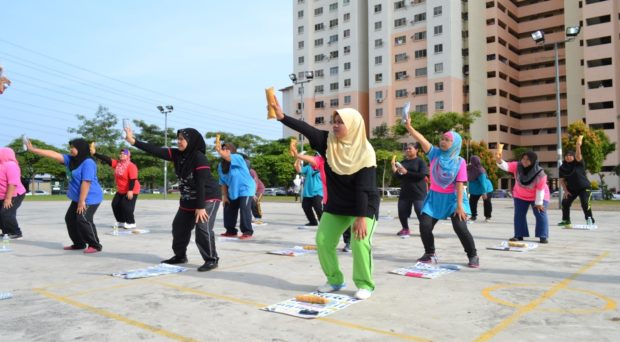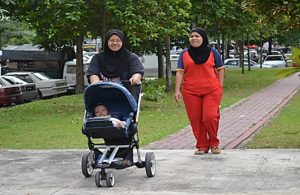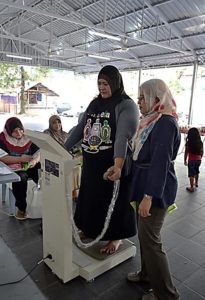
Obesity is a global threat and it is one of the risk factors associated with diabetes, hypertension and heart disease. It is a growing problem among women in Malaysia and other Asian countries, where the prevalence of obesity among women is much higher than among men. Various methods of weight reduction are reported in the literature and these include diet modification, physical activity or exercise regime, behavioral intervention and the use of self-monitoring weight loss tools.
In 2014, we carried out a quasi-experimental study for weight loss intervention among 328 overweight and obese housewives who lived in low cost housing (People’s Housing Project) in Kuala Lumpur, Malaysia. The study is called My Body is Fit and Fabulous at Home (MyBFF@home) and it was conducted for 12 months. MyBFF@home is one of the government efforts to combat obesity problems among adults in Malaysia.
Our study aims to empower overweight and obese women to participate in the weight loss intervention and to make several changes to their current lifestyle. In this study, changes in body weight, nutrient intake, body fat, glucose level, lipid profile, health literacy, quality of life and other clinical parameters were monitored and findings of the MyBFF@home are reported in this Supplement of MyBFF@home.

In the MyBFF@home study, we gave women in the intervention group a modest weight loss package consisting of four individual diet counseling sessions, monthly group exercise, dumb bell exercise (at home) and three self-monitoring tools (pedometer, food diary and physical activity diary). The control group only received seven group seminars related to women’s health and two self-monitoring tools (food diary and physical activity diary). We then compared the health outcomes between the groups (before and after) in the intervention and maintenance phases. The overview of the MyBFF@home can be found in the Introduction article of MyBFF@home.
At the beginning of the study, we found the readiness among the participants to participate in the weight loss program was more than 90% and the motivation level was also good. After 6 months, we detected several changes in body composition, blood pressure level, lipid profile, health literacy level and other parameters among the participants in both groups. These changes were discussed in the Supplement of MyBFF@home.
We discovered some interesting findings based on the data analyses. After 6 months, there were some changes in the body weight of the participants in both groups. Weight changes among the participants in the intervention group were greater than the control group. However, these changes were not sustained during the maintenance phase (after 12 months). Although there were no significant changes in overall weight between the two groups, we found that participants in the intervention group showed a significant increase in their muscle mass compared to before the intervention.
We also found some changes in quality of life among the participants before and after the intervention. Overweight and obese housewives experienced significant improvements in the Health Related Quality of Life (HRQOL) scores after the intervention phase.

Another interesting finding regards health literacy, which is linked to an individual’s knowledge, motivation and behavior in everyday life. We measured the health literacy level among all participants using the modified Newest Vital Sign (NVS) questionnaire and we found that the health literacy level among the participants in both groups was low at the beginning of the study.
After 6 months (weight loss intervention phase), the NVS score in both groups had increased compared to before intervention. However, in the maintenance phase we found that the NVS score of participants in the intervention group had increased further compared to the control group. This finding indicated that participants in the intervention group were more likely to sustain their behavioral change in everyday life and this could be explored further in the future research.
To our knowledge, MyBFF@home is the first and largest community-based intervention study among women from low socioeconomic background. Despite some limitations, MyBFF@home has empowered overweight and obese women to combat obesity and to self-monitor their daily diet and physical activities. It is our hope that the findings of the MyBFF@home could support various stakeholders in the obesity prevention program for women in Malaysia.
Comments